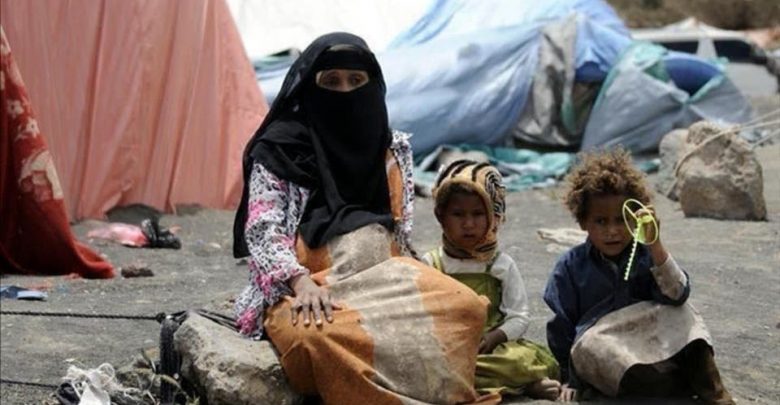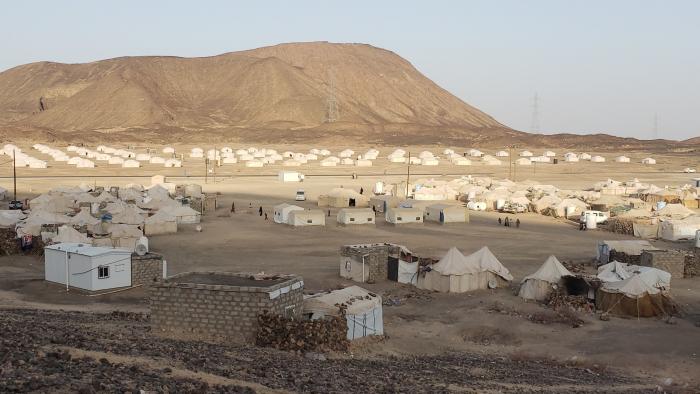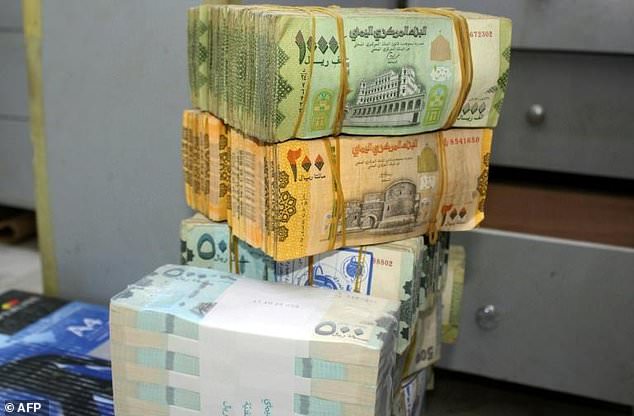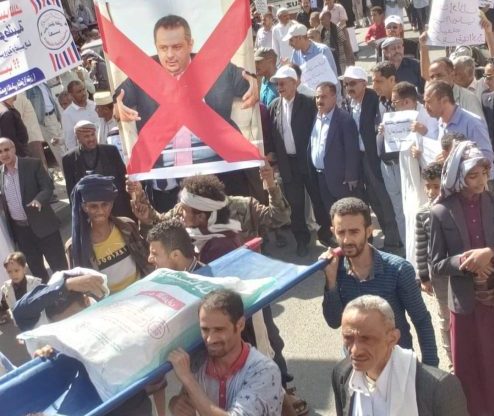
The United Nations High Commissioner for Refugees (UNHCR) has said that it plans to relocate 14,000 refugees from frontlines in the southern entrance of Marib city to safer areas in Marib al Wadi.
“As frontlines approach the southern entrance of Marib, hosting sites and civilian populations located in the city's outskirts face immediate safety concerns,” the UN agency warned.
It said that on the western front, nearly 1,930 displaced families in IDP sites in Sirwah district are now five kilometers away from the ongoing clashes, with increasing concern for their safety.
“UNHCR's partner in Marib, Society for Humanitarian Solidarity (SHS), in coordination with the Camp Coordination and Camp Management Cluster, is currently seeking relocation plans for these households to safer areas in Marib al Wadi, should there be a sudden displacement,” it noted.
Since the beginning of the year, UNHCR said it has distributed more than $62 million in cash assistance to over 175,000 displaced Yemeni and refugee families and that a large portion of this assistance went to displaced Yemenis, four times more at risk of hunger than the average Yemeni population.
According to the latest post-distribution monitoring data, up to 91 percent of beneficiaries spent the assistance on food and over 20 percent on rent.
UNHCR said that as part of the ongoing efforts to respond to the needs of some 1,260 newly assessed families (more than 7,000 individuals), SHS provided non-food items to 585 families (3,041 individuals), and emergency shelter kits to 340 families (1,747 individuals) recently displaced from Rahba, Al-Abdiyah, Al-Jubah and Jabal-Murad districts into Marib City and Marib Al Wadi districts.
Additionally, the UN agency has provided cash assistance to over 66,500 families in Marib so far this year.
In a separate report, UNHCR revealed that food, health, and nutrition service shortage in Harf Sufyan led to a spike in malnutrition cases, with more than 160 suspected cases.
It added that the start of the winter season in Sanaa governorate has created a dire need for winter and emergency shelter kits.
The UN agency also said that government-held areas host over 60 percent of all 141,600 refugees and asylum-seekers in Yemen and that most of them live in the urban areas of Aden, Mukalla and Sayun.
-Asharq Al-Awsat
-File photo
 رئيس اللجنة التحضيرية للحركة السياسية لشعب الجنوب يهنئ بن شاجع بشهر رمضان
رئيس اللجنة التحضيرية للحركة السياسية لشعب الجنوب يهنئ بن شاجع بشهر رمضان
 أمين عام حزب العدالة والحرية يهنئ بن شاجع بحلول شهر رمضان
أمين عام حزب العدالة والحرية يهنئ بن شاجع بحلول شهر رمضان
 اليمن: شخصيات اجتماعية وسياسية تهنئ الشيخ بن شاجع بحلول شهر رمضان
اليمن: شخصيات اجتماعية وسياسية تهنئ الشيخ بن شاجع بحلول شهر رمضان
 تكتل قبائل بكيل يهنئ أبناء اليمن بحلول شهر رمضان ويدعو الجميع الاصطفاف لمواجهة التحديات
تكتل قبائل بكيل يهنئ أبناء اليمن بحلول شهر رمضان ويدعو الجميع الاصطفاف لمواجهة التحديات
 بن شاجع يدعو لمراجعة المواقف والتوحد أمام التحديات الكبيرة التي يواجهها اليمن
بن شاجع يدعو لمراجعة المواقف والتوحد أمام التحديات الكبيرة التي يواجهها اليمن
 محكمة سعودية تبرئ مستثمرًا يمنيًا قُتل تحت التعذيب بتهمة كيدية
محكمة سعودية تبرئ مستثمرًا يمنيًا قُتل تحت التعذيب بتهمة كيدية
 الأمم المتحدة: نقص المساعدات فاقم الوضع الإنساني المتردي في اليمن
الأمم المتحدة: نقص المساعدات فاقم الوضع الإنساني المتردي في اليمن
 مسلحون قبليون يفجرون خطاً لأنابيب النفط في مأرب احتجاجا على رفع أسعار الوقود بالمحافظة
مسلحون قبليون يفجرون خطاً لأنابيب النفط في مأرب احتجاجا على رفع أسعار الوقود بالمحافظة
 المبعوث الاممي يعلن موافقة الأطراف اليمنية على بنود خطة سلام دائم
المبعوث الاممي يعلن موافقة الأطراف اليمنية على بنود خطة سلام دائم
 مأرب: قتلى وجرحى بسبب رفع أسعار الوقود والقطاع القبلي مستمر
مأرب: قتلى وجرحى بسبب رفع أسعار الوقود والقطاع القبلي مستمر












 فيسبوك
فيسبوك  تويتر
تويتر  يوتيوب
يوتيوب 
قيامك بالتسجيل وحجز اسم مستعار لك سيمكنكم من التالي:- الاحتفاظ بشخصيتكم الاعتبارية أو الحقيقية.
- منع الآخرين من انتحال شخصيتك في داخل الموقع
- إمكانية إضافة تعليقات طويلة تصل إلى 1,600 حرف
- إضافة صورتك الشخصية أو التعبيرية
- إضافة توقيعك الخاص على جميع مشاركاتك
- العديد من الخصائص والتفضيلات
إضغط هنا
إضغط هنا